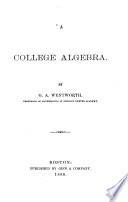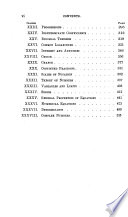 Thus ike modulus of the product of two complex numbers is the product of their moduli, and the argument of the product is the sum of their arguments. Thus ike modulus of the product of two complex numbers is the product of their moduli, and the argument of the product is the sum of their arguments.  College Algebra - Page 204by Leonard Eugene Dickson - 1902 - 214 pagesFull view College Algebra - Page 204by Leonard Eugene Dickson - 1902 - 214 pagesFull view - About this book
 | George Albert Wentworth - Algebra - 1888 - 514 pages
...sin ф')] . By Trigonometry, this may be written ?T>[Cos(<¿> + ф') + ¿sin (ф + фi)]. Therefore, the modulus of the product of two complex numbers is the product of their moduli ; and the amplitude of the product is the sum of the amplitudes. Consequently, the effect of multiplying... | |
 | Henry Burchard Fine - Algebra - 1890 - 154 pages
...6 cos 0' + cos 6 sin 0' = sin (0 + 0') .* Therefore (a+ib) (a'-M&')=PP'[cos(0+0')-Msin(0+0')] ; or, The modulus of the product of two complex numbers is the product of their moduli, its argument the sum of their arguments. The required construction is, therefore, made by drawing through 0 a line... | |
 | George Albert Wentworth - Algebra - 1891 - 550 pages
...sin </'')}. By Trigonometry, this may be written rr' [cos (ф + ф') + z sin (ф + ф')]. Therefore, the modulus of the product of two complex numbers is the product of their moduli ; and the amplitude of the product is the sum of their amplitudes. Consequently, the effect of multiplying... | |
 | William Henry Maltbie - Geometry, Analytic - 1906 - 156 pages
...</> + i (cos 9 sin <#> + sin 6 cos <#>)) = pP (cos (9 + 40 + i sin (6 + 40) It follows at once that the modulus of the product of two complex numbers is the product of the moduli, and the amplitude of the product is the sum of the amplitudes. This last theorem leads... | |
 | Godfrey Harold Hardy - Calculus - 1908 - 449 pages
...imaginary) part of the sum of two complex numbers is the sum of their real (or imaginary) parts. (2) The modulus of the product of two complex numbers is the product of their moduli. (3) One value of the amplitude of the product of two complex numbers is the sum of their amplitudes.... | |
 | Henry Lewis Rietz, Arthur Robert Crathorne - Algebra - 1909 - 296 pages
...+ bf)(c + di) = гV.¿Ccos 0i cos 02 + 1(sin 0i cos 02 -I- cos 0i sin 02) — sin 0i sin 02] Hence, the modulus of the product of two complex numbers is the product of their moduli and the argument is the sum of their arguments. The point P, which represents (a + bi) (c + di), may... | |
 | Alexander Ziwet, Louis Allen Hopkins - Geometry, Analytic - 1913 - 391 pages
...sin 02) = ri?'2[(cos 0i cos 02 — sin 0i sin 02) +i(sin 0i cos 02 + cos 0i sin 02)] This shows that the modulus of the product of two complex numbers is the product of the moduli, the amplitude of the product is the sum of the amplitudes, of the factors. The point P... | |
 | James Atkins Bullard, Arthur Kiernan - Trigonometry - 1922 - 252 pages
...02— sin 0i sin вг+г sin 0i cos 02 +г cos в1 sin 02), =r!r2 [cos (0i+02)+г sin (0i+02)]. Thus: The modulus of the product of two complex numbers is the product of their moduli, and the amplitude is the sum of their amplitudes. In particular when a complex number is multiplied... | |
 | Helen Abbot Merrill - Algebra - 1917 - 282 pages
...r'' But if r = r', equations (2) can be true only when 6 and 0' differ by a multiple of 2 TT. 197. Theorem. The modulus of the product of two complex numbers is the product of the two moduli, and the amplitude of the product is the sum of the two amplitudes. Let the two numbers... | |
 | Henry Burchard Fine - Calculus - 1927 - 446 pages
...+ г sin 0) • г' (cos в' + i sin в') = rr'[cos(e + в')+ i sin(0 + 0')] (4) The absolute value of the product of two complex numbers is the product of their absolute values, and its angle is the sum of their angles. The same is true of a product of n factors,... | |
| |